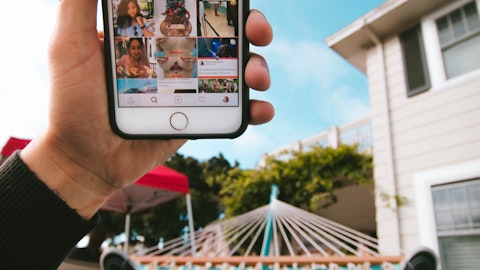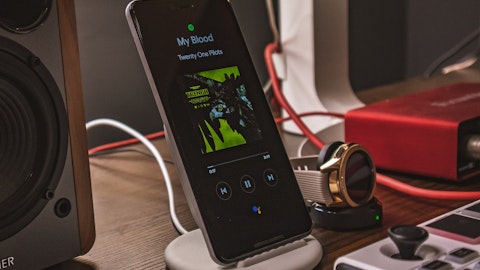Daniel Ek: In fact, we actually already do have some other pricing mechanics throughout the world. It’s easy to think that Spotify is a single proposition for everyone in the world. It’s far from today. So for instance, we have a day passes, it’s just one product that we’re offering in certain markets, week passes. We even have physical gift cards that people scratch cards from on a weekly basis in order to top up their Spotify listening. So we are very much adapting our pricing models in favor of what consumers want. And that’s something that you should expect us to continue to do. Now with that said, to touch a little bit, one of the things, of course, why we are talking about the Apple case is many things like, for instance, a la carte purchases, things like super-fan things like purchasing of audiobooks, top-up things that could be quite meaningful for Spotify’s revenues is a significant hindrance today because Apple insists on taking a 30% cut, which in many cases, exceeds even our own cuts that we’re able to take inside of the app.
So some of these more innovative things that we would like to do, we are currently restricted in doing on the iOS ecosystem, which limits some of that more innovative things that we would like to do. So yes, all-in-all, we are already doing it in other territories. We would like to do even more of it. But to do that, certainly in the Western world, which many of these markets being very heavily iOS influenced, we are precluded from doing it at a way where — which could be profitable and good for consumers and creators because of Apple stance.
Bryan Goldberg: All right. That’s a good segue into Michael Morris’ question on the Digital Markets Act. You posted twice about the DMA with the potential positives to your business and then also about your dissatisfaction with Apple’s proposed changes. Do you expect the DMA to be implemented in a way that supports your vision? And if so, what do you expect the new functions to be available? And how may they impact the company financially?
Daniel Ek: Yeah, Michael, I think the truth is we don’t know yet. We outline t our response to how we would be compliant with the DMA. But obviously, that then very much depends on Apple stance in allowing us to do so. And Apple then obviously subsequently responded with their stance, which is very much incongruent with our stance on the matter and frankly, I think it’s a bit of a forest because it looks on the surface that they’re complying with it, but behind the surface, they’re doing pretty much everything to make this such an unattractive experience that’s no same developer want to pick any of the new terms. Now the good news, I guess, from the investor standpoint, and I know that there initially with some questions about whether or not this would be a downside for Spotify.
I don’t think that’s the case. So we still have the ability to be on the old terms and keep going as we’re currently going. But there are future upsides that could be quite significant. We talked a little bit about it with fan clubs, all these other things that we could do for creators that we would probably be barred from doing because it simply would mean that all of Spotify would be unprofitable if we took these new terms. So no downside, but there would be quite a lot of upside if, in fact, we were going to be able to do what we wanted to do, not just for Spotify, but for creators and consumers alike. And just as a last reminder, this law will come into play in March 7th. So obviously, my hope is still very much that the European Commission will take action and allow this to happen because it will be far greater for the ecosystem, both for consumers and creators alike.
Bryan Goldberg: Okay. Our next question comes from Batya Levi on audiobooks. How should we think about the impact of audio booksconsumption cost on margins?
Paul Vogel: Yes. Thanks, Batya. So as you know, we don’t really break out the individual components like that. What I will say is while we’re investing in audiobooks, we still see a nice improvement in gross margin through 2024, which Ben has talked about at length already on the call. And so we feel like we have a model for audiobooks and the progression of audio books over the next couple of years. It’s going to be very additive. We’ve talked about at the Investor Day where we believe the long-term gross margin of the audiobooks business can get to. And so we’re still really encouraged about that. And in general, we’re very optimistic that you’re going to continue to see gross margin progression throughout 2024.
Bryan Goldberg: Okay. We’ve got another question from Kannan, this time on the music business. Has growth in international markets helped flip any major ones from fixed minimum payouts to variable payouts? And could we see some impact in 2024?
Paul Vogel: Great question, Kannan. The short version — the short answer to this question is, yes. I would say that it’s been a story of steady progress in sort of how we grow the user base and then begin to monetize them in these international markets and there’s really kind of two engines to this. It’s about sort of driving subscriber growth and building upon sort of the subscription revenues in these markets, but also making sure that we start to light up the advertising side in these markets as well, both of which basically ultimately help us clear these hurdles in fixed minimum payouts. So I think the story is one of ever constant progress in this department.
Bryan Goldberg: Okay. We’ve got another question from Doug Anmuth on podcasting. With most major podcast content renewals resolved, what are your key priorities for the podcast business in 2024?
Daniel Ek: Yes. Much more of a continuation of 2023 with the exception, obviously, as you said, we’ve kind of transitioned the podcasting business from one structure to a different structure throughout 2023, that’s mostly done. Now it’s back to innovation and growth again. What I’m most excited about is there are lots of things that creators are asking us to do that enables them to easier post content, have more ways of engaging with their audience. You’ve seen some of this already in 2023, as a reminder, you saw video podcasting growing in a healthy way on the platform. You’ve seen us add Q&A responses, which is quite phenomenal to see the comments that are showing up on Spotify. Now you’ve seen much more interactivity and more and more creators are starting to use those tools, but that’s just the beginning.
We have plenty of plans on podcasting, which I think will mean more content on the platform, which I also think means more engagement. So it has been a profitability story in 2023. And I think that’s going to play out. But where we’re focused on is really all about now growing podcasting and increasing it. And we think it’s a lot larger of a medium than most people really today give it credit for. So that’s not where we need to prove. But we are doing so from a profitable standpoint instead of one that’s losing a lot of money for us.
Bryan Goldberg: Okay. We’ve got a question from Rich Greenfield on user engagement. Daniel, you’ve talked about user interest in your Hack Day creation day list, which feels like another AIML use case to drive engagement. How is it impacting overall usage and time spent? And by the way, my day list for today is Sad Tailspin Tuesday.
Daniel Ek: All right. Well, hopefully, nothing we’re seeing on this call today gives you any reason to tailspin on a sad basis. But jokes aside, yes, I mean this, again, is a story of innovation at Spotify. What’s so cool is we have these crazy engineers and scientists inside of the company that dreams up these kind of weird and wonderful things, which seems like very narrow use cases, but this is culture. And what they do is they test culture and they bring it out and they personalize culture to people. And it turns out that people are just reacting in this weird and wonderful way, and they want to express their own identity through music, which in itself is not surprising. It’s a very core thing for humanity and something that we’ve been doing.





